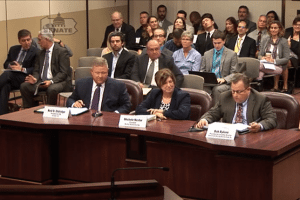
Lawmakers hear testimony from Ned Eldridge of eLoop (left), Michele Nestor of Nestor Resources and Bob Bylone of the Pennsylvania Recycling Markets Center.
Manufacturers say proposed changes to Pennsylvania’s e-scrap program would make it the worst in the country from an OEM perspective. Proponents, however, note the bill fixes dire problems that have led to rampant CRT dumping statewide.
According to the state’s Department of Environmental Protection (DEP), the legislation presents a solution to a number of flaws in the existing system.
“Ultimately we support a model that eliminates weight-based goals and ensures there is adequate funding to collect, transport, recycle all materials that Pennsylvania residents bring to collection sites,” said George Hartenstein of the DEP.
There are 432 electronics recycling sites in the state, according to Bob Bylone, executive director of the Pennsylvania Recycling Markets Center. But in a status report on the state of the current program, Bylone said the number of sites is “not a judgment of efficacy of ” the program. Only five sites in Pennsylvania accept all covered devices for no cost, he said. For example, many sites do not accept CRTs for free, leading some consumers to store or dump the devices.
Senate Bill 800 makes substantial changes to Pennsylvania’s extended producer responsibility program for electronics. It adds a point-of-sale fee on certain devices, eliminates collection targets and makes manufacturers financially responsible for all covered devices that are collected, and creates a state-run collection plan. The bill also counts as “recycling” placing CRT glass in retrievable cells.
Last week, the proposal had its first hearing in the Senate Environmental Resources and Energy Committee, where stakeholders weighed in on the changes. No action was taken on the bill.
Industry pushback
Walter Alcorn of the Consumer Technology Association (CTA) described a number of problems he identified with the proposed overhaul.
“I would say that this bill, SB 800, is frankly much less to our liking than any existing program anywhere in the country,” Alcorn said. “This would be the low point for us, the way that it’s written right now.”
Alcorn posited that given the fact manufacturers are on the hook to pay for recycling, the state should allow them to decide who does the work and how that work is done, within standards set by DEP.
“What this bill does, unfortunately, is it authorizes DEP to take over the system, which now is privately run,” he said. “And we don’t think that’s a good policy idea. … Let’s look at what the requirements are, let’s figure out how we can make it run better, but let’s don’t actually have the state take over the system.”
Francis Valluzzo, a consultant representing Dell, raised similar concerns about the legislation preventing manufacturer-led plans. Even though the bill allows manufacturers to opt out of the state program and run an independent plan, Valluzzo said the it makes it virtually impossible for OEMs to do so.
Industry representatives expressed particular concern the bill implements county-by-county collection targets. Alcorn previously told E-Scrap News this means it is not a total shift away from weight-based targets.
“Nobody ever sets requirements at a county level like that, I’ve never even seen that proposed anywhere in the country,” Alcorn told lawmakers. “Because the administrative burden of actually trying to track that and then make sure that it was met, it would be kind of a nightmare.”
Alcorn pointed out that manufacturers funded recycling of 62 million pounds of electronics in 2016, and said Pennsylvania’s program is one of the top-performing states in terms of amount recycled each year.
“I don’t think that the system as it currently exists is completely broken,” Alcorn said. “I think we can see and maybe even come to some common ideas on how we can fix it and make it work better.”
The Pennsylvania Retailers Association shared concerns retailers have with the legislation, particularly the point-of-sale fee and the costs of administering its collection. Vizio also submitted testimony in strong opposition to the current proposal.
Proponents make a case
Michele Nestor, president of local government consultancy Nestor Resources and chair of the state’s solid waste and recycling fund advisory committees, aimed to clear up what she described as misconceptions about the bill.
“It does not dismantle the system that exists right now. It does not force all of the electronic equipment that consumers may want to discard, into this system,” Nestor said. “It does ensure, however, that in every county, if that is the consumer’s preference, they may use the system and be assured that there will not be additional cost.”
Ned Eldridge, president and CEO of electronics recycling company eLoop, said the changes SB 800 makes would create a “very predictable program.” It would increase the sustainability and reliability of the program, he said.
Shannon Reiter, president of nonprofit group Keep Pennsylvania Beautiful, said illegal dumping of CRT TVs has become a major problem around the state.
“Local and county governments across the state are doing their best to address the electronics dumping issues and are often left with tens to hundreds of illegally dumped televisions piled up in warehouses and alleyways,” Reiter said. “Communities are then forced to absorb the cost of recycling and disposing these materials.”
Communities have resorted to holding their own collection events to cut down on dumping, but these are costly and inefficient for the municipal governments, Reiter said.
The state’s electronics landfill ban “has become an unfunded mandate for local communities,” she said. “In our opinion, the best way to prevent the dumping of these materials is to be proactive and provide universal access to convenient, affordable recycling options.”
More stories about EPR/stewardship
- ERCC outlines shift toward convenience benchmarks
- Diversion Dynamics: Vape recycling needs policy to reach full charge
- E-Scrap EPR round-up part 3: Illinois and Oregon